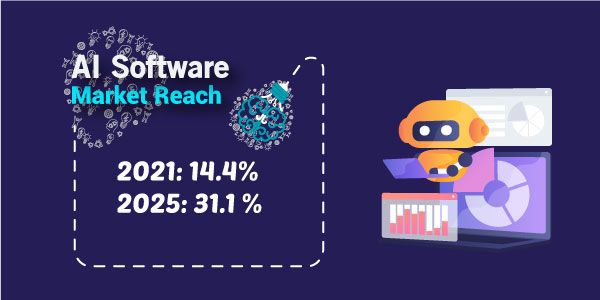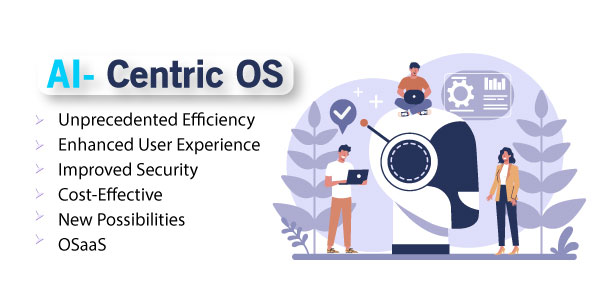How AI Might Challenge the Traditional Operating Systems?

Artificial Intelligence (AI) has taken the world by storm. This innovation is helping people write stories, translate languages, and design aesthetic images. However, the potential of AI exceeds the current usage. AI can transform complete software structures as developers build their products on AI platforms instead of traditional operating systems. In 2025, the AI software market is projected to reach nearly $134.8 billion, with a growth rate set to surge from 14.4% in 2021 to an impressive 31.1% in 2025, surpassing the overall software market growth significantly.

Traditional Operating Systems: An Outdated Approach
The operating system is a fundamental tool for overseeing a range of computer components. These encompass the processor, memory, storage, input devices (like keyboards and mice), and output devices (such as monitors and speakers). Delegating the intricate task of efficiently handling system resources to the operating system yields several advantages.
One of the key benefits is simplifying and enhancing software applications’ stability.
In the early days, operating systems, like those developed by Microsoft, were simplistic, text-based iterations, with the real work transpiring behind the scenes. In the modern era, Windows and Apple’s iOS present standardized frameworks for interacting with their platforms. As a result, it enables external developers to create software more seamlessly. These operating systems go beyond the surface. They can take on tasks ranging from managing battery levels to facilitating smooth app transitions and secure password storage.
The integration of features within iOS and Android has gradually blurred the boundary between the operating system and individual applications. It has been a continuous process spanning several decades. Significantly, these platforms are inherently incompatible. With rare exceptions, software designed for one operating system cannot function on another. This dilemma has compelled developers to choose one platform or invest resources in creating multiple versions of their products.
While this approach raises costs for software developers, it concurrently erects a figurative walled garden for the operating system providers. These providers can impose licensing fees, dictate usage terms, and retain control over deployment methods.
Shifting to AI-Centric Operating Systems: Unveiling the Advantages

In our ever-changing tech environment, the excitement surrounding AI isn’t mere buzz; it’s a genuine game-changer. As we venture deeper into AI-centric operating systems, let’s explore the potential benefits of this significant transformation.
- Unprecedented Efficiency
AI-centric operating systems have the power to streamline our daily tasks. Imagine an OS that understands your habits, optimizes power usage, and predicts the applications you will likely use next. This level of automation can make our devices significantly more efficient, saving time and energy.
- Enhanced User Experience
These AI-driven systems can adapt to your preferences and behaviors. They’re like personal digital assistants that learn from your interactions. Consequently, your interaction with technology evolves into a more personalized and user-centric experience. It’s no longer a one-size-fits-all approach. It’s uniquely tailored to you.
- Improved Security
AI-powered operating systems can detect and respond to security threats in real-time. They’re like vigilant guards, protecting your data and devices from malicious attacks. With AI’s ability to analyze patterns and anomalies, you’ll have peace of mind knowing your system is always on the lookout.
- Cost-Effective
Traditional static operating systems often come with fixed licensing fees. In contrast, AI-centric systems can be tailored to bill us based on our real usage. This approach better matches our requirements and financial plans, resulting in long-term cost savings.
- Open the Door to New Possibilities
Integrating AI at the core of our operating systems opens up a world of possibilities. Developers can create innovative applications and services that were previously out of reach. From healthcare to entertainment, AI-centric systems enable new horizons.
- OS as a Service (OSaaS)
This concept might redefine the way we think about operating systems. With dynamic AI-based systems, switching to another OSaaS may become more challenging. Just as people stick with their preferred cloud service providers due to the effort and cost involved in switching, OSaaS could offer similar loyalty benefits.
AI as Operating Systems: Catalysts for Future Innovation
We must shift our perspective regarding AI systems, viewing them not merely as software but as the operating systems upon which a new generation of applications will thrive. With the introduction of GPT-4 in March, we’ve witnessed numerous companies seamlessly integrating OpenAI’s model into their existing services or using it as the foundation for innovative offerings. Take Duolingo, for example, which leverages this AI to provide students with immersive role-playing scenarios.
As time progresses, we can expect third-party developers to veer away from creating products tailored to traditional operating systems. They may focus on crafting solutions that align perfectly with the specific AI model that suits their requirements. This shift is poised to generate a self-reinforcing cycle: The ecosystem expands as more software applications emerge for a given AI platform. As a result, it attracts additional application providers to partake in this burgeoning landscape.
AI platform developers like OpenAI, Google, and Microsoft are racing to introduce their products and seize the market swiftly. Notably, Amazon.com Inc. has recently unveiled a suite of products under Amazon Web Services, dubbed Bedrock. It allows cloud customers to harness tools developed in collaboration with other AI enterprises. It includes A21 Labs, a text-generation startup from Israel, and Stable Diffusion, a British player in image generation.
Their dynamic nature sets AI-based operating systems apart, constantly adapting and learning from increased usage. This model proves highly lucrative, as platforms can charge based on actual use rather than a fixed fee. In this landscape, AI platforms taking on the role of operating systems could potentially give rise to a concept known as “OS as a service” (OSaaS). With dynamic operating systems in place of the traditional static approach, switching away from such a system would become more challenging, akin to how clients often remain loyal to their chosen cloud service providers due to the significant time and cost barriers associated with migration.
Wrapping Up
AI isn’t just a tool or an application; it’s steadily transforming into the backbone upon which the forthcoming wave of groundbreaking applications and services will thrive. As AI systems continue their evolution and grow in sophistication, the boundaries separating the traditional operating system and individual applications are beginning to fade. It creates fresh avenues of potential. Third-party developers are increasingly redirecting their efforts toward crafting products that seamlessly align with specific AI models. Thus, it nurtures a continuous cycle of innovation.
Across the tech industry, major players are in a frantic race to harness AI’s vast potential. They are eagerly rolling out new products and services that capitalize on the remarkable capabilities of artificial intelligence. This shift may ultimately give rise to the concept of “OS as a Service.” The traditional operating systems, while still relevant, now face a compelling challenge from the AI-powered operating systems of tomorrow. It promises a transformative journey into the digital future.





